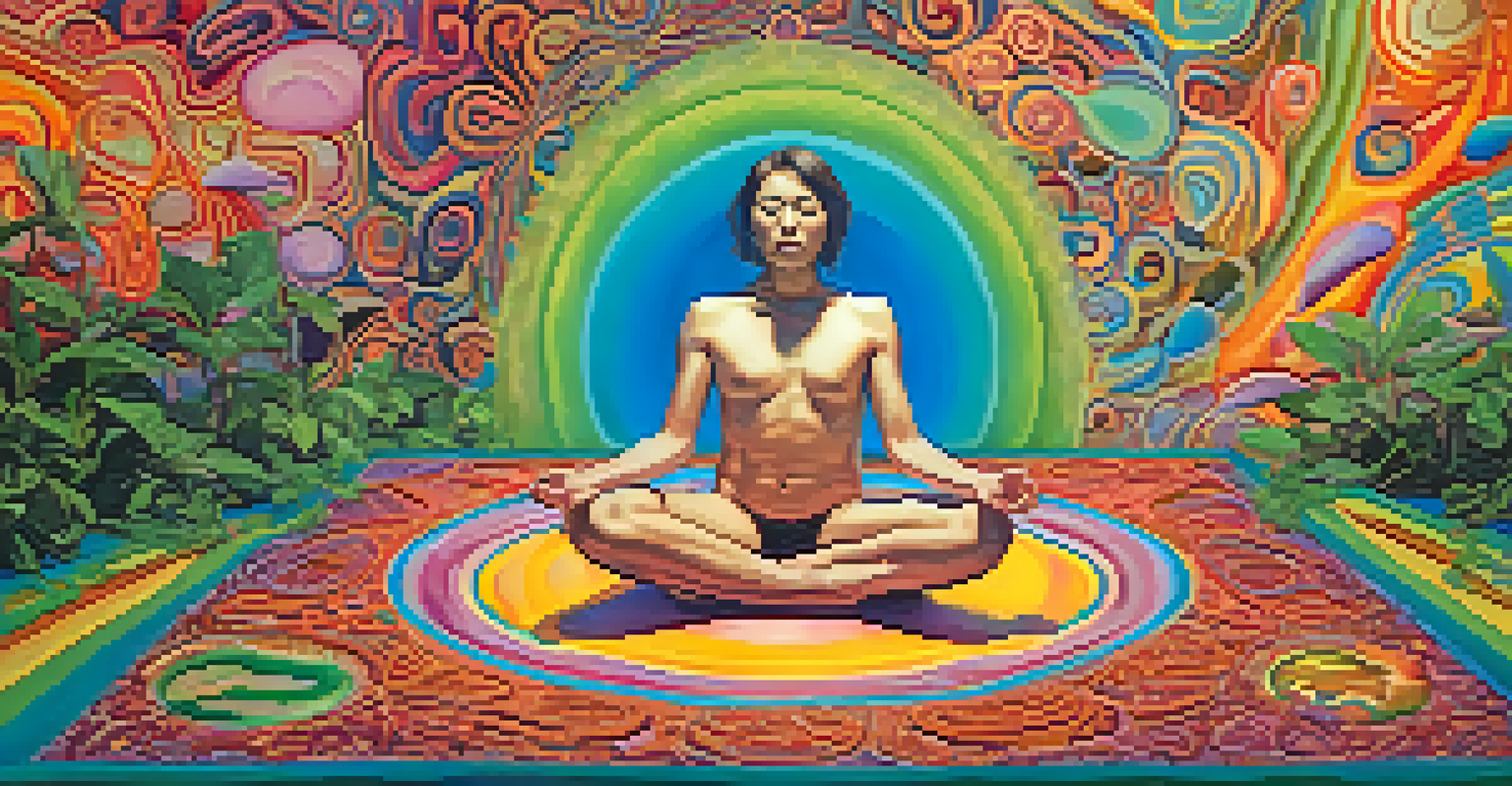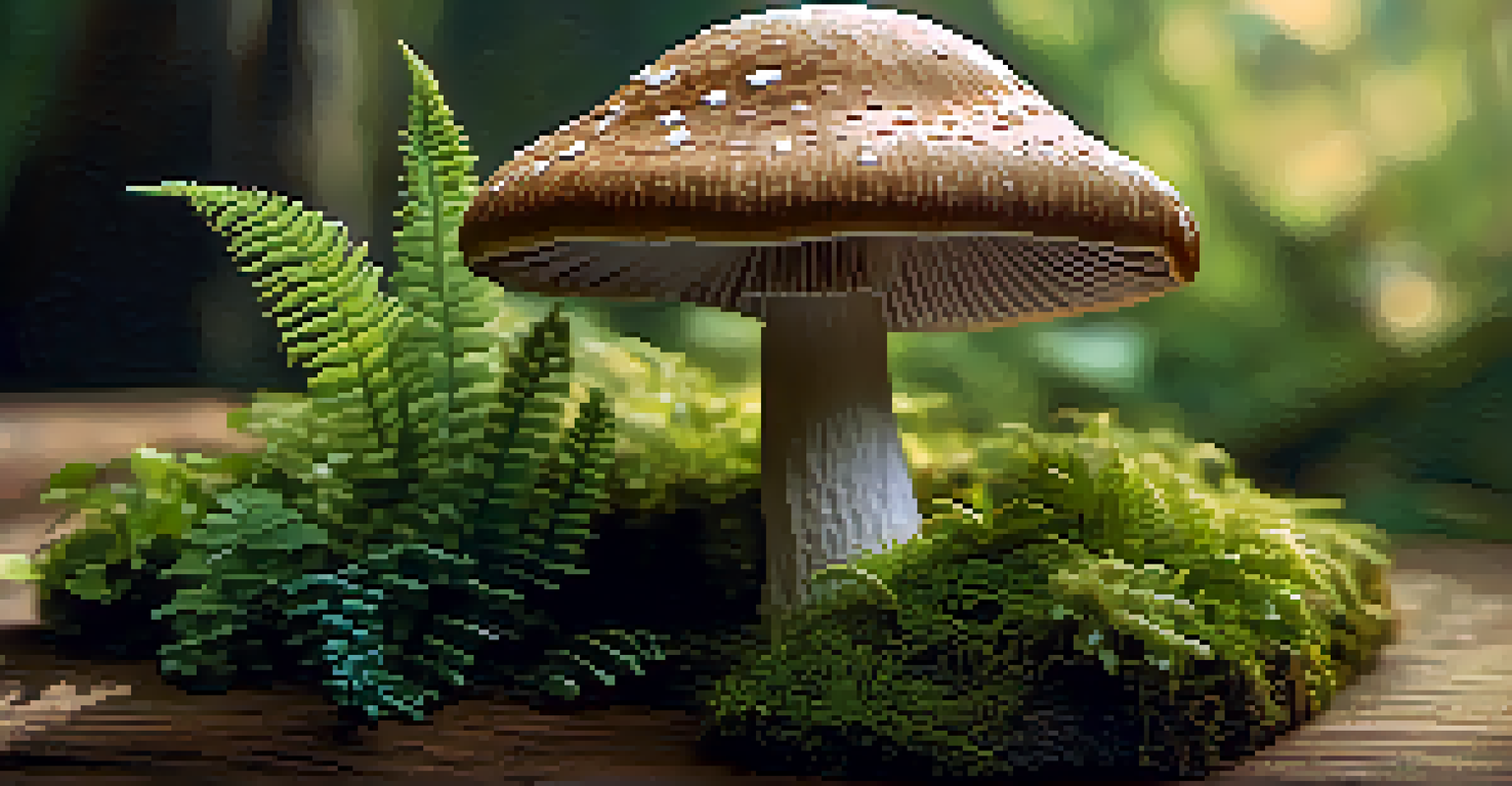Cultural Contexts: Entheogens and Identity Exploration

Understanding Entheogens and Their Cultural Significance
Entheogens are substances that induce spiritual or mystical experiences, often used in religious or cultural rituals. These plants and fungi, such as peyote and psilocybin mushrooms, have been part of human history for centuries. Many cultures regard them as sacred tools for connecting with the divine or accessing deeper truths about existence.
The greatest discovery of my generation is that a human being can alter his life by altering his attitudes.
In various indigenous cultures, entheogens are not merely recreational substances but essential components of spiritual practice. For example, the use of ayahuasca in Amazonian tribes provides insights into the self and the universe, fostering a sense of community and shared understanding. This highlights how these substances can shape not just personal identity but also collective cultural identity.
As society becomes more interested in these substances, it’s crucial to appreciate their original contexts. Misunderstanding or misappropriating entheogens can lead to a disconnect from their rich cultural heritage. Therefore, recognizing their significance is essential for anyone interested in exploring identity through these powerful experiences.
Personal Transformation Through Entheogenic Experiences
Many individuals embark on journeys with entheogens seeking personal transformation and insights into their identity. These experiences can lead to profound realizations about oneself, often helping individuals confront past traumas or clarify life paths. For instance, someone might use psilocybin mushrooms to explore feelings of anxiety or depression, uncovering deeper emotional patterns and fostering healing.

The transformational aspect of entheogens often emerges through their ability to alter perception and consciousness. Users frequently report feeling a sense of unity with the universe, which can reshape their understanding of self and purpose. This shift in perspective can be a catalyst for personal growth and change, encouraging individuals to reassess their beliefs and values.
Entheogens: Cultural Significance
Entheogens are sacred substances used in various cultures to facilitate spiritual experiences and deep personal insights.
Moreover, such experiences are often shared within a community, further enhancing the sense of identity. When people come together to explore these substances, they create a collective narrative that enriches their individual journeys. This communal aspect reinforces the idea that identity is not just a solitary journey but a shared experience deeply rooted in social connection.
Cultural Appropriation vs. Cultural Appreciation
As entheogens gain popularity in Western cultures, the line between cultural appropriation and appreciation becomes blurred. Many individuals seek to use these substances without understanding their cultural origins or significance. This can lead to a commodification of sacred practices, which not only disrespects the traditions but also diminishes the potential benefits of these experiences.
We are not human beings having a spiritual experience; we are spiritual beings having a human experience.
Cultural appropriation occurs when elements of one culture are taken by another, often without permission or understanding. In the context of entheogens, this might involve using indigenous practices without acknowledging their origins or the communities that hold them sacred. Such actions can perpetuate harmful stereotypes and exploit marginalized cultures.
On the flip side, cultural appreciation involves a respectful acknowledgment and understanding of the practices and beliefs tied to these substances. Engaging with indigenous communities, learning from their teachings, and approaching entheogenic use with humility can foster genuine connections. This approach not only enriches personal experiences but also honors the rich histories of these cultures.
The Role of Ritual in Entheogenic Experiences
Rituals surrounding the use of entheogens play a vital role in shaping the experience and its outcomes. These practices can provide structure and context, helping individuals navigate their journeys with intention and respect. For many cultures, rituals are essential for preparing the mind and body, ensuring a safe exploration of consciousness.
For instance, traditional ceremonies often include prayers, songs, and guided meditations that enhance the experience. This ceremonial framework can facilitate a deeper connection to the substance and the surrounding community. Participants often emerge with a heightened sense of belonging and purpose, reinforcing their identity within the group.
Transformation Through Community
Experiences with entheogens often lead to personal growth and healing, especially when shared within a supportive community.
Additionally, rituals serve to integrate the lessons learned during the entheogenic experience into everyday life. By providing a context for reflection and discussion, they help individuals make sense of their insights and apply them meaningfully. This process of integration is crucial for transforming fleeting experiences into lasting personal growth.
Entheogens and Mental Health: A Growing Interest
Recent research has shed light on the potential mental health benefits of entheogens, sparking interest in their therapeutic applications. Studies have shown that substances like psilocybin can assist in treating depression, anxiety, and PTSD, offering hope for those seeking alternative therapies. This growing body of evidence highlights the importance of understanding the psychological effects of these substances.
For many individuals, the therapeutic use of entheogens can lead to profound identity shifts. The experiences often help people confront and process difficult emotions, leading to a greater sense of self-acceptance and understanding. As individuals navigate these challenges, they often find new pathways for personal growth and healing.
However, it is essential to approach this area with caution and respect, ensuring that entheogenic experiences are facilitated safely and within appropriate contexts. The potential benefits should not overshadow the necessity for informed guidance and integration support. In doing so, we can honor the legacies of these substances while exploring their role in mental health and personal identity.
Legal and Ethical Considerations in Entheogenic Use
The legal landscape surrounding entheogens is complex and varies significantly across different regions. While some places have begun to decriminalize or legalize certain substances for therapeutic use, others maintain strict prohibitions. Navigating these laws is crucial for anyone interested in exploring entheogens responsibly and ethically.
Ethical considerations also arise when discussing entheogen use, particularly regarding safety and informed consent. It’s vital for users to be fully aware of what they’re engaging in and to have access to accurate information about potential risks and benefits. This level of transparency ensures that individuals can make informed decisions about their journeys.
Navigating Ethics and Legality
It is crucial to approach the use of entheogens with respect for their cultural origins, ethical considerations, and legal frameworks.
Moreover, as interest in entheogens grows, there are concerns about the commercialization of these substances. The potential for exploitation can undermine the sacredness of their use and the communities that have traditionally engaged with them. Promoting ethical practices in the field helps preserve the cultural integrity of entheogens while fostering a safe environment for exploration.
Future Directions: Entheogens and Identity in a Globalized World
As globalization continues to shape cultural exchanges, the role of entheogens in identity exploration is evolving. More individuals are seeking to understand their personal identities through these substances, often blending traditional practices with contemporary approaches. This fusion can lead to rich, transformative experiences but also raises questions about authenticity and respect.
The future of entheogenic exploration may involve a more integrated approach, combining insights from various cultures while honoring their origins. This could foster a deeper understanding of the self in relation to the larger world, promoting empathy and connection among diverse groups. As more people engage with entheogens, there is potential for a collective awakening to shared human experiences.

Ultimately, the journey of exploring identity through entheogens is both personal and communal. By prioritizing respect for cultural origins, ethical practices, and safe exploration, we can create a space where individuals can discover their true selves. This delicate balance will be essential in shaping the future discourse around entheogens and their role in identity exploration.